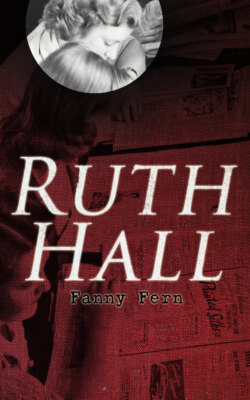Читать книгу Ruth Hall - Fern Fanny - Страница 29
На сайте Литреса книга снята с продажи.
CHAPTER XXVI.
ОглавлениеTable of Contents
October had come! coy and chill in the morning, warm and winning at noon, veiling her coat of many colors in a fleecy mist at evening, yet lovely still in all her changeful moods. The gay butterflies of fashion had already spread their shrivelled wings for the warmer atmosphere of the city. Harry and Ruth still lingered;—there was beauty for them in the hill-side’s rainbow dyes, in the crimson barberry clusters, drooping from the wayside hedges; in the wild grape-vine that threw off its frost-bitten leaves, to tempt the rustic’s hand with its purple clusters; in the piles of apples, that lay gathered in parti-colored heaps beneath the orchard trees; in the yellow ears of Indian corn, that lay scattered on the seedy floor of the breezy barn; in the festoons of dried apples, and mammoth squashes, and pumpkins, that lay ripening round the thrifty farmers’ doors; and in the circling leaves, that came eddying down in brilliant showers on the Indian summer’s soft but treacherous breath.
* * * * *
“You are ill, Harry,” said Ruth, laying her hand upon his forehead.
“Slightly so,” replied Harry languidly; “a pain in my head, and—”
A strong ague chill prevented Harry from finishing the sentence.
Ruth, who had never witnessed an attack of this kind, grew pale as his teeth chattered, and his powerful frame shook violently from head to foot.
“Have you suffered much in this way?” asked the physician who was summoned.
“I had the fever and ague very badly, some years since, at the west,” said Harry. “It is an unpleasant visitor, doctor; you must rid me of it as soon as you can, for the sake of my little wife, who, though she can endure pain herself like a martyr, is an arrant little coward whenever it attacks me. Don’t look so sober, Ruth, I shall be better to-morrow. I can not afford time to be sick long, for I have a world of business on hand. I had an important appointment this very day, which it is a thousand pities to postpone; but never mind, I shall certainly be better to-morrow.”
But Harry was not “better to-morrow;” nor the next day; nor the next; the doctor pronouncing his case to be one of decided typhus fever.
Very reluctantly the active man postponed his half-formed plans, and business speculations, and allowed himself to be placed on the sick list. With a sigh of impatience, he saw his hat, and coat, and boots, put out of sight; and watched the different phials, as they came in from the apothecary; and counted the stroke of the clock, as it told the tedious hours; and marvelled at the patience with which (he now recollected) Ruth bore a long bed-ridden eight-weeks’ martyrdom, without a groan or complaint. But soon, other thoughts and images mixed confusedly in his brain, like the shifting colors of a kaleidoscope. He was floating—drifting—sinking—soaring, by turns;—the hot blood coursed through his veins like molten lava; his eye glared deliriously, and the hand, never raised but in blessing, fell, with fevered strength, upon the unresisting form of the loving wife.
“You must have a nurse,” said the doctor to Ruth; “it is dangerous for you to watch with your husband alone. He might injure you seriously, in one of these paroxysms.”
“But Harry has an unconquerable dislike to a hired nurse,” said Ruth; “his reason may return at any moment, and the sight of one will trouble him. I am not afraid,” replied Ruth, between a tear and a smile.
“But you will wear yourself out; you must remember that you owe a duty to your children.”
“My husband has the first claim,” said Ruth, resuming her place by the bed-side; and during the long hours of day and night, regardless of the lapse of time—regardless of hunger, thirst or weariness, she glided noiselessly about the room, arranged the pillows, mixed the healing draught, or watched with a silent prayer at the sufferer’s bed-side; while Harry lay tossing from side to side, his white teeth glittering through his unshorn beard, raving constantly of her prolonged absence, and imploring her in heart-rending tones to come to his side, and “bring Daisy from the Glen.”
Many a friendly voice whispered at the door, “How is he?” The Irish waiters crossed themselves and stept softly through the hall, as they went on their hasty errands; and many a consultation was held among warm-hearted gentlemen friends, (who had made Harry’s acquaintance at the hotel, during the pleasant summer,) to decide which should first prove their friendship by watching with him.
Ruth declined all these offers to fill her place. “I will never leave him,” she said; “his reason may return, and his eye seek vainly for me. No—no; I thank you all. Watch with me, if you will, but do not ask me to leave him.”
In the still midnight, when the lids of the kind but weary watchers drooped heavily with slumber, rang mournfully in Ruth’s ear the sad-plaint of Gethsemane’s Lord, “Could ye not watch with me one hour?” and pressing her lips to the hot and fevered hand before her, she murmured, “I will never leave thee, nor forsake thee.”
